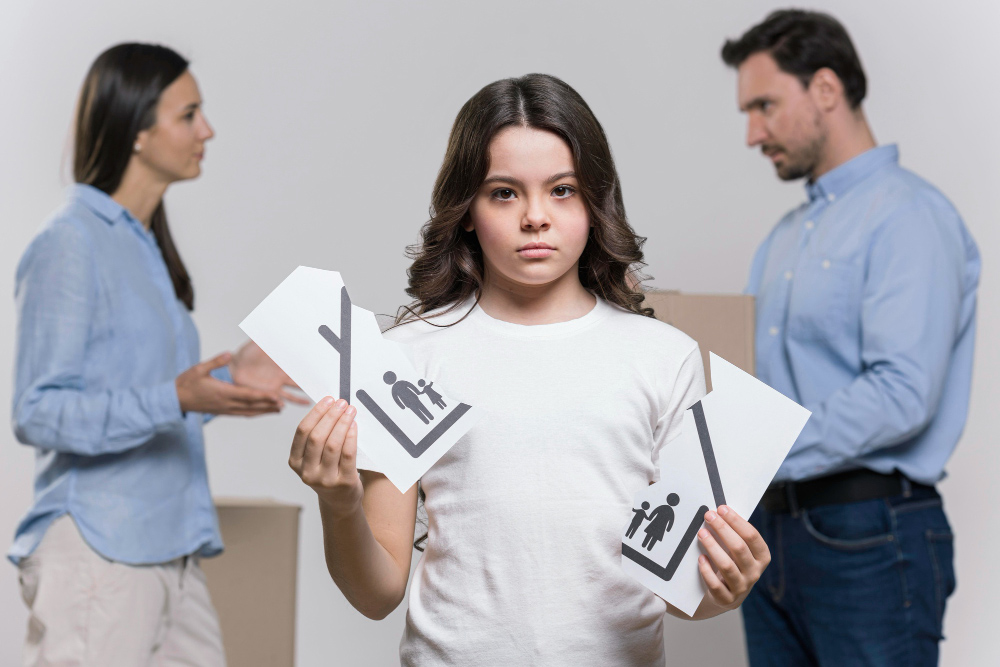The Emotional Impact of Divorce on Children

Feelings of Loss and Sadness
Children often experience a profound sense of loss when parents decide to separate. They may feel like they're losing a part of their family structure, a shift that can lead to sadness and grief. It's important for both parents to provide reassurance of their love and support during this time.
Anxiety and Stress
The uncertainty that accompanies divorce can create anxiety and stress for children. They may worry about changes in their living situation, schools, and even their friendships. Such stress can manifest in physical symptoms, including headaches and stomachaches, making it essential for parents to maintain open lines of communication and provide stability wherever possible.
Anger and Blame
Children might feel angry towards one or both parents, and some might even blame themselves for the breakup. This misplaced guilt can lead to long-term emotional issues if not addressed promptly. Encouraging children to express their feelings and ensuring they understand that divorce is not their fault can help mitigate these feelings.
The Psychological Effects of Divorce
Changes in Behavior
Behavioral changes are common among children of divorced parents. They might exhibit increased aggression, withdrawal, or developmental regressions. Addressing these behaviors early, possibly with the help of a therapist, can prevent further complications.
Academic Performance
Divorce can also affect a child's performance in school. The emotional turmoil may distract them from their studies, leading to a drop in grades or a lack of interest in extracurricular activities. Keeping teachers informed and engaging with school counselors can provide additional support for the child.
Long-term Implications
While many children adapt over time, some may carry the emotional effects of divorce into adulthood. Issues such as trust, relationship difficulties, and fear of commitment can stem from their parents' separation. Seeking professional help can equip children with coping mechanisms to address these challenges.
How Mediation Attorneys Can Help
The Role of a Mediation Attorney
A mediation attorney acts as a neutral third party to help couples reach agreements on key issues like child custody, visitation, and support. In Orlando, FL, attorneys like those at Ilvento Law can facilitate discussions that prioritize the children's best interests, aiming to reduce conflict and foster cooperation between parents.
Crafting a Child-Centric Agreement
Mediation attorneys focus on creating agreements that serve the children's needs first. By considering factors like school schedules and extracurricular activities, they help craft arrangements that minimize disruptions in the child's life.
Reducing Conflict
Divorce can be contentious, but mediation offers a less adversarial approach. By reducing conflict, mediation can lessen the stress on children, who often feel caught in the middle. An experienced attorney will guide conversations to ensure both parties feel heard and respected, paving the way for a more amicable resolution.
Offering Support and Guidance
Beyond legal advice, mediation attorneys provide emotional support and practical guidance. They can recommend family therapists or counselors who specialize in helping children cope with divorce, ensuring families have access to comprehensive support.
Why Choose Mediation Over Litigation?
A Quicker Resolution
Mediation often leads to quicker resolutions compared to litigation. This means less time in the legal system and more time for children to adjust to their new normal.
Cost-Effective
Mediation can be more cost-effective than going to court. Lower legal fees mean more financial resources can be allocated to supporting the child’s needs during this transition.
Preserving Relationships
By fostering cooperation rather than conflict, mediation helps preserve family relationships. This is especially important for co-parenting, as maintaining a functional relationship benefits the child's well-being.
Finding the Right Mediation Attorney in Orlando, FL
Expertise and Experience
Choosing the right mediation attorney is crucial. Look for professionals with extensive experience in family law and a track record of successful mediation outcomes. An attorney familiar with Florida laws will ensure all agreements comply with state requirements.
Personal Connection
Since divorce is a personal process, finding an attorney you feel comfortable with is important. A good mediator should be empathetic, patient, and communicative, providing reassurance throughout the process.
Reputation and Reviews
Research potential attorneys by reviewing testimonials and seeking recommendations from others who have gone through similar experiences. A reputable mediation attorney will have positive feedback from clients who valued their approach and effectiveness.
Conclusion
Divorce is hard on children, but the right support can make a significant difference. For families in Orlando, FL, working with a mediation attorney can provide a path to resolving disputes amicably, focusing on the children’s best interests. If you're navigating a divorce, contact Ilvento Law today to learn more about how mediation can benefit your family and ensure your children’s well-being during this challenging time.
By understanding the impact of divorce on children and choosing mediation as a constructive solution, parents can help ease the transition and lay the foundation for a healthier future.